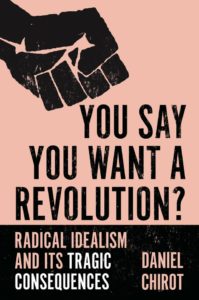From Mexico to Iran, democracy is often a casualty of revolutionary politics undertaken in the name of liberty or opposition to tyranny, says a leading observer.
The best-known modern revolutions have invariably been preceded by increasing polarization and an inability to solve pressing social and economic problems, notes Daniel Chirot, the Herbert J. Ellison Professor of Russian and Eurasian Studies at the Henry Jackson School of International Studies at the University of Washington.
Growing hostility and mistrust fuel protest, eventually leading to violence. Extremism increases because moderates find themselves forced to ally themselves with those farther to the left or right. Those who try to find compromises with moderate forces on the other side wind up being vilified and excluded, he writes in Reform or Revolution? for Project Syndicate.
 What can we learn from these and many analogous cases? Chirot asks in The American Interest:
What can we learn from these and many analogous cases? Chirot asks in The American Interest:
- For one, it’s that revolutionary outcomes only seem pre-ordained in hindsight. Once the violence begins, events can quickly spin out of control as counterrevolutionary forces fight back and revolutionary extremists take control. Foreign intervention against the revolution makes that even more likely. Of the great modern revolutions, the American one stands out as an exception because ruling domestic elites never lost control and limited their revolution to political rather than social and economic changes…..
- Secondly, moderate liberal reformers have repeatedly failed to grasp how dangerous radicals really are. ….. Shapour Bakhtiar, a liberal opponent of royal dictatorship in Iran was repeatedly jailed by the Shah, and only brought to power in 1978, too late to save the situation. He eased the transition to democracy but was forced to flee by Khomeini, and he was eventually murdered by Iranian agents in Paris.
- A third general lesson that can be drawn from modern revolutions is that they are all eventually corrupted. After radicals have established a dictatorship, the means of exposing and controlling corruption cease to be available to these regimes. That is what has happened to the majority of anti-colonial “Third World” revolutionary regimes like those of Angola and Algeria, or the Baathist ones in Syria and Iraq……
- Finally, the fourth conclusion is that reform can take place without revolution as long as political elites understand the need for gradual change and compromise….RTWT
This essay is adapted from You Say You Want A Revolution? Radical idealism and Its Tragic Consequences, published by Princeton University Press.







